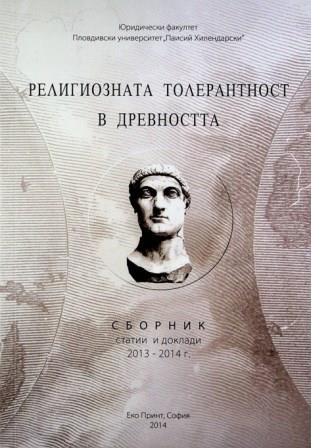Относно религиозната толерантност и влиянието на християнството в римското право
Religious Tolerance and the Influence of the Christianity on Roman Law
Liberation of Persones in a State of Clerical Slavery and the Rescripts of Emperor Constantine to the Bishops of Cordoba Ozius (C.J. 1.13.2/C.Th. 4.7.1) and Serdica Protogen (C.J. 1.13.1)
Author(s): Juan M. Alburquerque, Salvador Ruiz Pino
Subject(s): Law, Constitution, Jurisprudence, Canon Law / Church Law, Roman law
Published by: Пловдивски университет »Паисий Хилендарски«
Keywords: religious tolerance; christianity; influence; rescripts; emperor Constantine
Summary/Abstract: The article examines the main legal measures included in the Edict of emperor Galerius, issued in Serdica, 311 and the Edict of Milan, issued by Licinius and Constantine in Milan, 313. As a result of the greatly popularized religious tolerance which gradually turns into a process of the favouritism of the Christian religion, there exists a common notion of humanization of law under the influence of Christianity in terms of its philosophy and world view. It is visible in certain legislative institutions when it comes to private law but more prominently in relation to the provision of Christian communities and their leaders with administrative and executive law rights, that are concerned with religious practitioners and their priests as well (episcopalis audientia). By assigning the bishops these functions a chance is given for effective influence by Christianity on a number of issues that are part of private law. With relation to that the article observes a major procedure for the change of private status- liberation of clerical slaves (manumission in ecclesiis, in sacrosanctis ecclesiis, or in ecclesia). Two parallel constitutions concerned with these issues and addressed to the bishop Serdica Protogen (C.J. 1.13.1.) and the bishop of Cordoba Ozius (C.J. 1.13.2) are analysed in the details.
Book: Религиозната толерантност в древността : Сборник статии и доклади 2013-2014
- Page Range: 97-107
- Page Count: 11
- Publication Year: 2014
- Language: Bulgarian
- Content File-PDF

